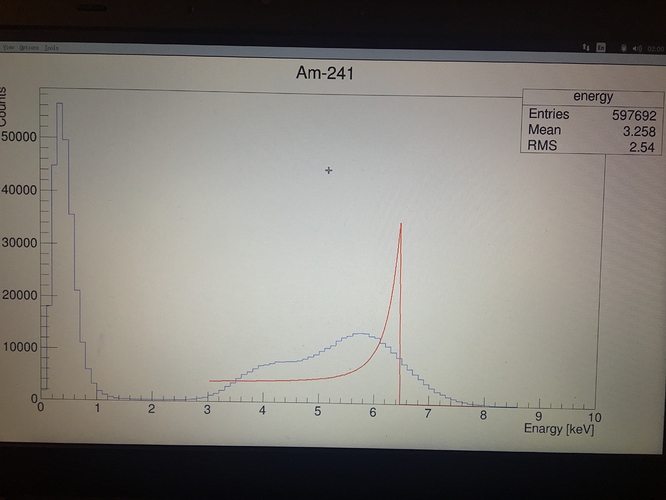Noor1
November 21, 2017, 1:03am
1
Dear Rooters
Can I use the crystalball fitting function using ROOT 5, it gives me error that this function is not defined.
/****************************************/
Double_t crystalball(Double_t *x, Double_t *par)
{
double A = pow((par[1]/par[0]),2)* TMath::Exp(-par[0]*par[0]/2);
double B = (par[1]/par[0])-par[0];
double C = (par[1]/par[0]) *(1/(par[1]-1))* TMath::Exp(-par[0]*par[0]/2);
double D = TMath::Sqrt(TMath::Pi()/2)*(1+TMath::Erf(par[0]/TMath::Sqrt(2)));
double N= 1/(par[3]*(C+D));
double fitval = 0.;
if( (x[0]-par[2])/par[3] > -par[0])
fitval = N*TMath::Exp (-0.5*pow((x[0]-par[2])/par[3],2));
else
fitval = A*(B- pow(((x[0]-par[2])/par[3] ),(-par[1])));
//fitval = N*TMath::Exp (-0.5*pow((x[0]-par[2])/par[3],2)) ;
return fitval;
}
...
...
...
TF1 *func = new TF1("crystalball",crystalball,3,8,4);
// Sets initial values and parameter names
func->SetParameters(1,3,7,3);
func->SetParNames("Alpha","Constant","Mean_value","Sigma");
calibrated_energy->Fit("crystalball","XR");
/****************************************************/
this is my defined function and the fitting lines, do I have wrong estimation for the initial parameters??
please any suggestion for the best fitting
I am sorry for the bad quality image
//
// The "crystalball" function for ROOT 5.x (mimics ROOT 6.x).
//
// Create the "crystalball" TF1 somewhere in your source code using:
// double xmin = 3., xmax = 8.; // whatever you need
// TF1 *crystalball = new TF1("crystalball", crystalball_function, xmin, xmax, 5);
// crystalball->SetParNames("Constant", "Mean", "Sigma", "Alpha", "N");
// crystalball->SetTitle("crystalball"); // not strictly necessary
//
// #include "TMath.h"
#include <cmath>
// see math/mathcore/src/PdfFuncMathCore.cxx in ROOT 6.x
double crystalball_function(double x, double alpha, double n, double sigma, double mean) {
// evaluate the crystal ball function
if (sigma < 0.) return 0.;
double z = (x - mean)/sigma;
if (alpha < 0) z = -z;
double abs_alpha = std::abs(alpha);
// double C = n/abs_alpha * 1./(n-1.) * std::exp(-alpha*alpha/2.);
// double D = std::sqrt(M_PI/2.)*(1.+ROOT::Math::erf(abs_alpha/std::sqrt(2.)));
// double N = 1./(sigma*(C+D));
if (z > - abs_alpha)
return std::exp(- 0.5 * z * z);
else {
//double A = std::pow(n/abs_alpha,n) * std::exp(-0.5*abs_alpha*abs_alpha);
double nDivAlpha = n/abs_alpha;
double AA = std::exp(-0.5*abs_alpha*abs_alpha);
double B = nDivAlpha -abs_alpha;
double arg = nDivAlpha/(B-z);
return AA * std::pow(arg,n);
}
}
double crystalball_function(const double *x, const double *p) {
// if ((!x) || (!p)) return 0.; // just a precaution
// [Constant] * ROOT::Math::crystalball_function(x, [Alpha], [N], [Sigma], [Mean])
return (p[0] * crystalball_function(x[0], p[3], p[4], p[2], p[1]));
}
1 Like
ksmith
November 21, 2017, 4:07pm
3
Noor1
November 22, 2017, 9:10am
4
@Wile_E_Coyote thank you for the reply and defining the crystal-ball function, that was really helpful and the fitting is going perfectly now
Noor
system
December 6, 2017, 9:10am
5
This topic was automatically closed 14 days after the last reply. New replies are no longer allowed.

